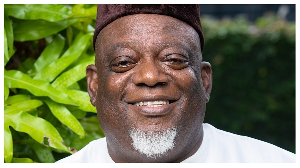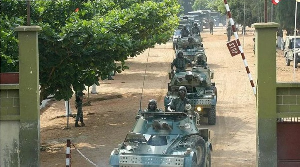President Akufo-Addo has been petitioned to remove Chief Justice Gertrude Torkonoo due to her alleged Misbehaviour and incompetence.
A Ghanaian citizen, Prof. Stephen Kwaku Asare, who filed the petition, claims the Chief Justice has violated the constitution and the administrative system, necessitating her dismissal in order to preserve the integrity of the judiciary.
The Petitioner, Stephen Kwaku Asare, aka Kwaku Azar, a US-based professor of accounting and lawyer, expects the President to follow through with the various constitutional provisions governing the process.
He has, among other issues, cited the Chief Justice for interfering with judicial power.
The petitioner contends that reconstitution of judicial panels is the ultimate way to interfere with or control the impartiality and independence of a panel's judicial work guaranteed by Article 127(2) and 19(13) of the Constitution (1992).
According to him, the Constitution is clear that no person, including the President, Parliament, or the Chief Justice, shall interfere with judges, judicial officers, or other persons exercising judicial power in the exercise of their judiciary functions. (Article 172 (2)). Thus the reconstitution under the guise of exercising administrative power is a glaring abuse of her office and a fundamental misunderstanding of the boundaries of the Chief Justice's administrative authority. The abuse of her administrative power to interfere with panels' meets the threshold of stated misbehavior.
The instances listed below, the petitioner claims are illustrative of how the Chief Justice has interfered with the judicial power of duly constituted court panels that are seized with a case.
The Opuni trial:
The ongoing case involving Mr. Opuni (The Republic v. Stephen Kwabena Opuni, Seidu Agongo, Agricult Ghana Ltd) is a glaring example of the Chief Justice abusing his administrative powers to reconstitute a duly constituted Supreme Court panel that is seized of matter on the judicial side. In this case, Justice Honyenuga, who presided over the matter at the trial level, proceeded on retirement.
The trial was reassigned to Justice Kwasi Anokye Gyimah, who at the time presided over the Division of the High Court, in Accra before which the case was placed. The Court presided over by Anokye Gyimah J ruled on April 4, 2023, that the trial should start afresh (de novo), considering the need to observe witness demeanor and the fairness concerns raised by the defense. This has always been the practice in criminal trials, in contrast to civil trials where the parties had the option to adopt the proceedings or start the trial de novo. This common law position is reiterated in The Republic v High Court (Criminal Division): Ex Parte Stephen Kwabena Opuni et al., (Civil Motion No. J5/87/2023, judgment delivered on 24th January 2023). The judge's ruling therefore fell within the expectations of many legal practitioners and judges.
The Attorney General appealed this ruling at the Court of Appeal. On July 3, 2023, a three-member Court of Appeal panel led by Justice Philip Bright Mensah, with Justices Jennifer Abena Dadzie and Ernest Owusu Dapaah.
High Court should adopt the proceedings from the trial conducted by Justice Honyenuga, emphasizing that the High Court's decision to start the case afresh was a misdirection.
In the meantime, the Chief Justice transferred Justice Anokye Gyimah to Kumasi and moved Justice Aboagye Tandoh from the High Court in Winneba to replace him. Several commentators linked the sudden transfer of Justice Anokye Gyimah to his disagreement with the Attorney-General on commencing the trial de novo. They publicly questioned whether Justice Anokye's was transferred because he could not be trusted to conduct the trial in a manner pleasing to the Attorney-General.
It is submitted that the Chief Justice's failure to provide any reason for the transfer fueled the public perception that the transfer was actuated by malice. It is well established that the arbitrary power to transfer judges is as damaging to judicial independence as the arbitrary power to appoint and dismiss them. Sound administrative practice requires that judicial transfers be based on objective and verifiable criteria to protect independent and impartial judges.
Further fueling the perception that the Chief Justice is abusing her power to attain a predetermined outcome in the Dr. Opuni case, the Chief Justice again abused her administrative powers to interfere with the judicial function of another judicial panel involving the Dr. Opuni case.
Reconstitution of panel for the hearing of Dr. Opuni's appeal:
Dr. Opuni's legal team, led by lawyer Samuel Codjoe, filed an interlocutory appeal at the Supreme Court on July 7, 2023, arguing that the Court of Appeal erred in its judgment. Several months after the appeal was filed, parties appeared before the Supreme Court on January 17, 2024, for a hearing. The Court presided over by Justice Mariama Owusu, along with Justices Yaw Darko Asare, Emmanuel Yonny Kulendi, George Kingsley Koomson, and Henry A. Kwofie ordered the parties to file written submissions.
On May 8, 2024, the Chief Justice controversially reconstituted the panel hearing Dr. Opuni's appeal, presiding over the new panel, which included Justices Mariama Owusu, Henrietta Mensa-Bonsu, Yaw Darko Asare, and Ernest Gaewu. Only two of the original five justices remained. Lawyer Samuel Codjoe objected to the new panel, citing Article 157(3) of the Constitution, which stipulates that a judge or panel cannot withdraw from a case after hearing arguments until judgment is delivered.
Despite his objection, the Chief Justice-led panel overruled him, and the case proceeded with the new panel. On June 19, 2024, the Supreme Court dismissed Dr. Opuni's appeal, ruling that the Court of Appeal was correct in directing the High Court to adopt the previous proceedings.
There was no administrative authority for the Chief Justice to reconstitute the panel in the Opuni case without assigning any justifiable reasons. It once again generated public and adverse discussions on the judiciary led by the Chief Justice. The Chief Justice literally run a one-person show by exercising unconstitutional powers to interfere with the judicial functions of a duly constituted court panel that had previously issued directives to the parties.
The power to dispense with court panels at will is not only unknown to the Constitution but it is also anachronistic, antithetical to judicial norms, makes the judicial system susceptible to the abuse of power, and erodes public confidence in the judiciary as an independent arbiter of disputes.
The Ablakwa case:
On 25th June, 2024 lawyers for the Honourable Member of Parliament for North Tongu objected to a reconstituted panel of the Court of Appeal. They contended that to the best of their knowledge, the panel to which the case was assigned are: Senyo Dzamefe (Presiding), Alia Serwaa Asare-Botwe, and Archer JJA. They however observed that the panel had been reconstituted by the substitution of Dzamefe and Archer JJA for Pamela Koranteng (Presiding) and Kweku Ackaah Boafo JJS leaving Asare-Botwe JA as the only Justice of the original panel. The reconstituted panel dismissed the objection holding that there was no evidence to suggest bias as the basis for the reconstitution.
Subsequently, however, evidence emerged that Justice Dzamefe was initially empanelled to preside over the matter but was written to, to return the docket to the Chief Justice. Justice Senyo Dzamefe will be subpoenaed to testify in the matter.
Republic v Elisha Mahama & 2 others:
On Wednesday the 22nd of May 2024 the prosecution in a case numbered UW/ WA/ DC/ B1/ 10/ 2024, intituled Republic v Elisha Mahama Akparznyiche & 2 Others appeared in the High Court, sitting in Wa for the hearing of the case. It was announced in Court that the Chief Justice had directed that on the completion of the committal proceedings before the Wa district court "any further proceedings shall be transferred to Kumasi." This directive to transfer the matter to be heard in Kumasi justifiably outraged many indigenes of the Upper West because of the venue of the crime and the residence of the parties.
The Chief Justice's decision was questioned on grounds of reasonableness given the fact that the hearing of the matter in Wa was proper, more convenient and understandable having regard to the High Court Wa's proximity to the place where the crime was committed, the residence of many of the witnesses and also the prosecution.
Although the Chief Justice subsequently rescinded her decision, her exercise of administrative power to transfer the case to Kumasi was in this instance exposed as arbitrary.
KA
Watch the latest video on TrendingGH below:
General News of Wednesday, 18 December 2024
Source: www.ghanaweb.com

















